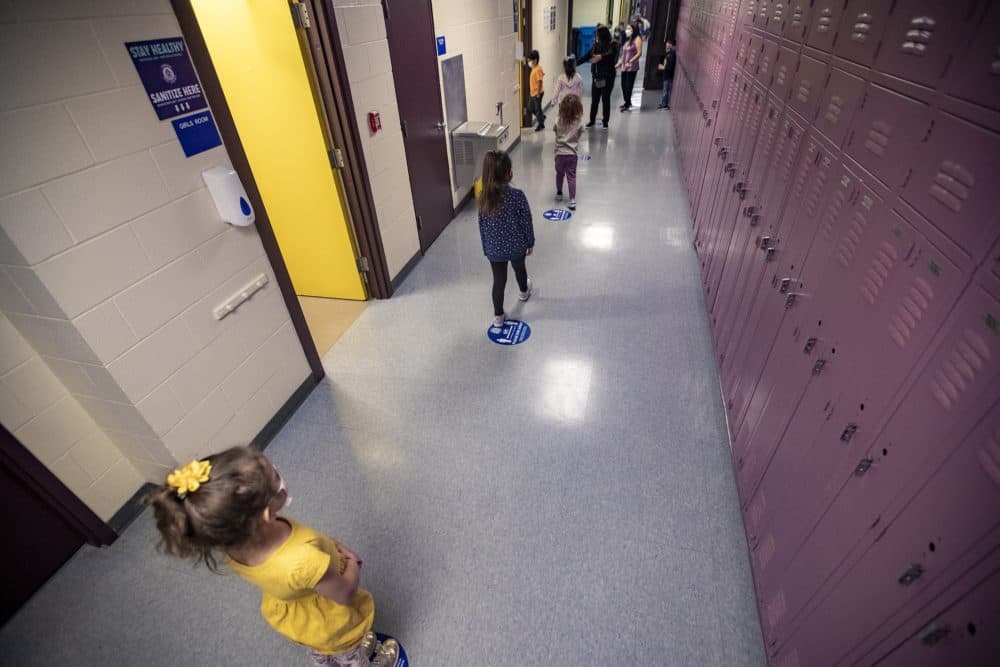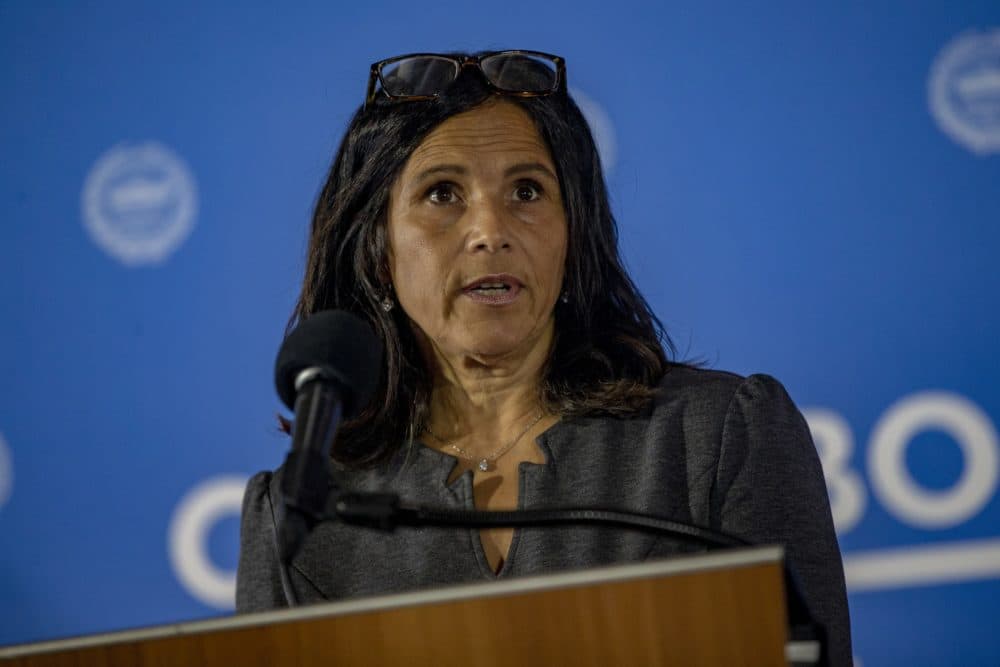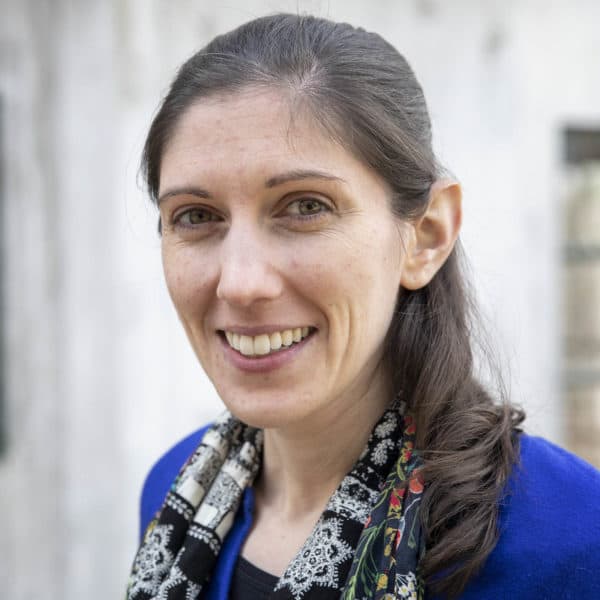Advertisement
Parents raise alarms over Boston Public Schools’ handling of COVID outbreaks

Shortly before Halloween, Kate Mitchell got an email from her children’s school, Manning Elementary in Jamaica Plain, letting her know that someone had “recently accessed the building and has tested positive for COVID-19 … it does not appear that anyone will need to quarantine.”
Mitchell, who has a third grader and a first grader at the Boston public school, said shortly after that initial vague but official communication parents started sending each other a flurry of WhatsApp messages.
“The message that really stuck with me was from one parent who said that a fourth-grade parent had told her of six cases in the fourth-grade classroom,” Mitchell said. “And that parent wanted more people to know about it.”
As the next several days unfolded, Mitchell tried to piece together what was happening, and what the Boston Public Schools (BPS) system was doing to address the situation. She's one of many parents who expressed alarm about what they see as gaps in the district’s planning for school outbreaks.
In the past couple weeks, COVID cases have spiked in BPS, with three schools grappling with outbreaks and case numbers reaching their highest level this school year.
At Manning Elementary, the outbreak appears to be contained. However, at least 16 people — or roughly 10% of the school — have tested positive for the virus. The nearby Curley K-8 School in Jamaica Plain is now shut down for 10 days as officials try to get a handle on the spread of the virus. And Orchard Gardens K-8 Pilot School in Roxbury has also seen COVID cases in the low double-digits.
"... it happened so rapidly that it has been challenging for our team to keep up.”
BPS Superintendent Brenda Cassellius
Some parents with children at these schools say communication from BPS has been frustratingly slow. They say there has not been sufficient contact tracing or investigation, and that BPS does not appear to have an emergency outbreak plan in place.
At a community meeting held Tuesday to address the Curley School closure, Superintendent Brenda Cassellius acknowledged that “it happened so rapidly that it has been challenging for our team to keep up.”
During the 10 days the Curley School is closed students and staff can quarantine and get tested, and BPS will increase staffing for its testing and contact tracing programs. Cassellius said the district will “put in new operational procedures," too, to ensure "this does not happen again.”
Communication
Mitchell kept her kids home for several days based on information in the parents' WhatsApp group, which suggested the outbreak was more significant than BPS had yet acknowledged. Mitchell said a lack of timely information from BPS officials is more than frustrating. It’s unfair.
“My bigger concern with those informal channels is the people who are not connected to them. A lot of us made decisions to keep our kids home from school based on what we learned from other parents,” she said. “There are families who never got linked up to these WhatsApp groups, or whose kids take the bus so they're not on the playground chatting with other parents.”
"My bigger concern with those informal channels is the people who are not connected to them. A lot of us made decisions to keep our kids home from school based on what we learned from other parents."
Kate Mitchell
Another parent at Manning Elementary, Sharon Daura, compiled a timeline based on details she said were shared at a community meeting, suggesting five days elapsed between when the first person tested positive and when the community was notified about it.
In an email to parents, school officials explained that they can’t inform the community of a positive case until after all close contacts are notified.
“There’s very strict protocols,” said Superintendent Cassellius, speaking at a press conference Tuesday. “There is often a lag in the information, and then sometimes rumors get ahead of us.”
Jennifer Lo, medical director of the Boston Public Health Commission (BPHC), which advises BPS, said school district officials are trying to balance sharing information about coronavirus infections with maintaining patient confidentiality.
“It's a very difficult line to balance,” she said, noting that in a small community like a school someone might be able to identify who tested positive if information is shared about what grade the case was in or what extracurricular they participated in.
Advertisement
But parents like Mitchell — who works in public health — counter that BPS has cited privacy concerns too often.
“It just makes me want to scream from the rooftops: We're not asking for personal medical information,” Mitchell said. “We're asking for very basic, broad numbers that can help us make decisions about what's safe for our families.”
Contact Tracing And Investigation
Mitchell said she eventually learned that her daughter, a third-grader, sat next to one child who tested positive and behind another kid who tested positive.
“I never received a phone call from any contact tracer,” she said.
Mitchell was not the only one. Other parents said they believe their child was a so-called "close contact" of someone who tested positive, but contact tracers never reached out to help explain protocols and collect information that might limit further spread.

Still, Cassellius warned parents against jumping to conclusions about who is deemed a close contact. “You may think that you are a close contact, but indeed [according] to CDC guidance, you would not be,” she said. “I think that has created some frustration with parents.”
Cassellius acknowledged testing and contact tracing have been hard to do in a timely manner at the Curley School, where, as of Nov. 9, at least 46 people have tested positive in 21 classrooms.
“We had up to 500 rapid COVID tests that we were having to give every single day, and we just weren't able to keep up with that and make sure that we were able to contact trace,” Cassellius said at the Curley School’s community meeting. “And that's as transparently as I can share with you how challenging this is.”
By shutting down the school, BPHC’s Lo added, “we are essentially treating the entire school campus as close contacts.”
BPS said they recently increased their contact tracing capacity to handle about 4,000 cases, up from 1,000.
Mei Elansary, a pediatrician and parent to a child at Manning Elementary, said she’d like to see more than contact tracing. She’d like to see an investigation into where and how the spread happened: was it likely at lunch, on the playground, on the bus? Was there transmission from teacher to students? Did it happen in a classroom where there is a low level of students consenting to testing?
“We assume there's some investigation going on as to understanding how this outbreak happened, but that information has not yet been shared with us,” Elansary said. “Until we know what happened, we can't really fix it.”
A Push To Improve Plans
Some parents said they are still left wondering whether and why the district was caught unprepared. Bevin Kenney, a physician and parent at Manning Elementary, said it seemed like BPS was only ready for individual cases.
“An outbreak is a whole other ball of wax. And I just don't think they had a plan for it,” Kenney said.
When requesting BPS’ emergency plan for COVID outbreaks and how authority would be delegated, a spokesperson pointed to their COVID protocols website and said in a statement: “BPS follows the guidance of the Boston Public Health Commission, as well as City of Boston HHS, the CDC and other appropriate state and federal authorities.”
"Basically, the principal has been deputized to be an infection control officer and to do some epidemiology."
Bevin Kenney
Kenney said that because Manning Elementary is a small school, with just 160 students, the principal was able to step in. She swabbed noses for hours — including on the weekend — and called all the families in a positive group test to inform them they needed to get individual tests.
“Basically, the principal has been deputized to be an infection control officer and to do some epidemiology,” Kenney said.
Parents at both the Curley School and Manning Elementary have joined a group of parents, guardians and grandparents from 15 different BPS schools that say the district needs to upgrade not just its response to COVID outbreaks, but some other COVID policies, too.
The group, calling itself BPS Families for COVID Safety, formed this fall, and meets weekly to compare notes across schools and advocate for things like vaccine clinics at every school, tents at every school so students can eat lunch outdoors and air quality monitoring in cafeterias.
Suleika Soto is one of the founding members. Her children are at Blackstone Elementary and TechBoston Academy, and she also serves on the Citywide Parent Council. She said she understands school officials are dealing with a lot, but she hasn’t been satisfied with the response parents have been getting.
“It’s really frustrating," Soto said. "We are hearing a lot of reasons why things aren't possible."
Both parents and school officials agreed that the recent spate of cases are an opportunity to once again evaluate and improve the district’s COVID procedures.
“This situation here makes us just take a pause and make sure that we have everything in place,” said Cassellius, discussing the Curley School’s closure. “We want to learn from this so that we can put in place the proper protocols in case we do have a rapid spread again and just be sure that we're keeping everybody safe.”
This article was originally published on November 10, 2021.
This segment aired on November 10, 2021.
